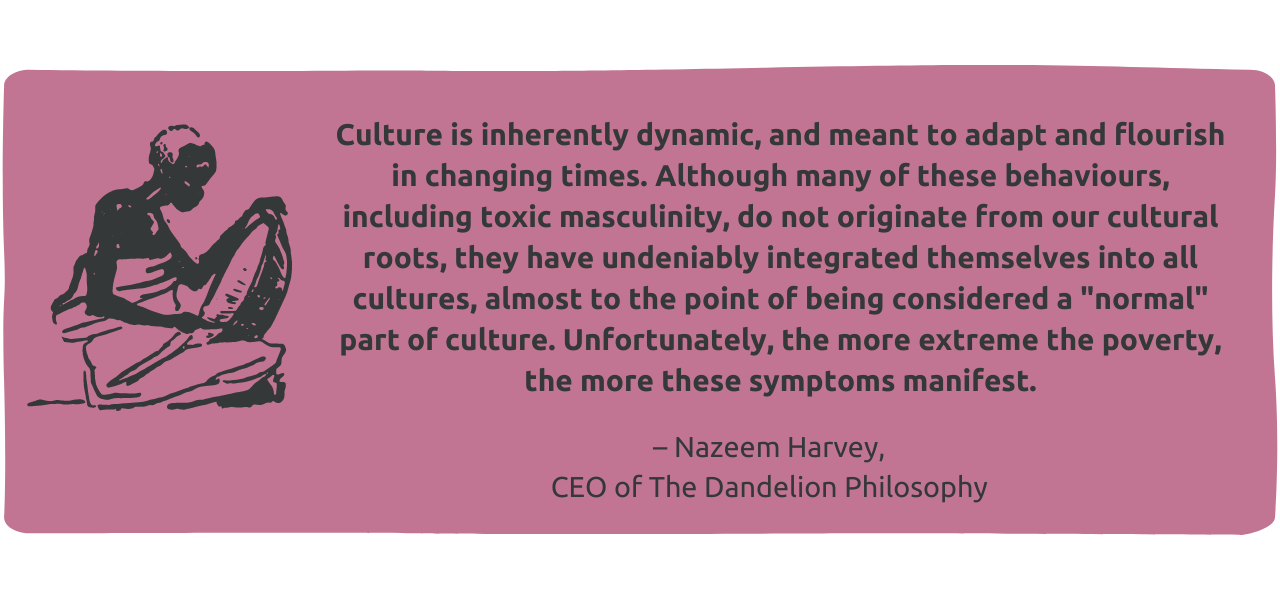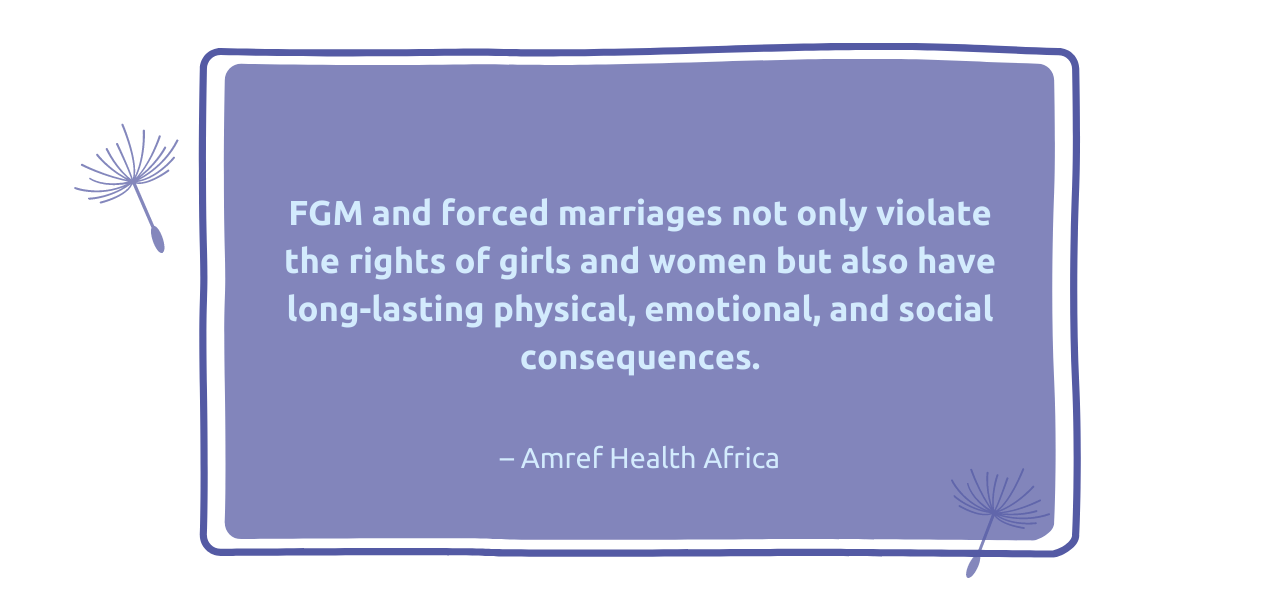Navigating and Modernising Masculinity
Cultures around the world are rich in diverse traditions that have shaped the roles and identities of its people for generations. In our intricate web of customs, rituals, and values, the role of men holds significant importance, carrying with it a complex interplay of expectations, traditions, and gender norms.
While strides towards modernisation and gender equality have been made, the paradigm of toxic masculinity persists, hindering progress and perpetuating harmful behaviours, perceptions, and beliefs.
At The Dandelion Philosophy, our approach to community development and healing is always holistic. Our vision for transformation extends beyond addressing the visible impacts of poverty, inequality, and inequity; we delve deeper into the unseen psychological factors intertwined with poverty, examining them within the framework of historical and cultural context.
This comprehensive strategy requires confronting biases, stereotypes, and prejudices head-on. It seeks to understand the intricate dynamics that shape roles and relationships between men and women, where poverty very often intensifies detrimental gender imbalances.
Historical Context and Traditional Roles
From communal practices in the Aboriginal tribes of Australia to the Zulu warriors of South Africa, the roles of men in different societies are highly nuanced. Men were traditionally seen as providers, protectors, and decision-makers within their communities. Historically, their roles extended to agriculture, hunting, and guarding their villages against external threats. Men were also entrusted with leading ceremonies, passing down ancestral knowledge, and preserving cultural heritage.
Many cultures still practise intricate initiation rituals to transition boys into manhood, which marks a shift in societal roles and expectations. Elders and chiefs, often also men, played a significant role in guiding the direction of their society.
Colonialism, globalisation, modernisation, shifts in power dynamics, economic systems, and cultural influences have all challenged and reshaped the roles of men within their respective communities. Women have increasingly gained access to education, employment, and leadership positions, and this has disrupted definitions of traditional roles.
While this transformation is vital for promoting gender equality, it also presents challenges for men to adapt to evolving societal expectations and pressures.
At what point does masculinity become toxic?
“Toxic masculinity" refers to a set of cultural norms and behaviours that promote or result in harmful and restrictive attitudes about what it means to be a man. It involves expectations that men should be dominant, emotionally detached, aggressive, and suppress certain emotions, such as vulnerability or sensitivity. Behaviours aimed at avoiding “weakness” and “femininity” in men can lead to harmful consequences, such as sexism, homophobia, violence, and the repression of men's own emotional well-being.
The Toxic Masculinity Paradigm
Despite our evolving global landscape, aspects of toxic masculinity continue to exist in all cultures, leading to harmful behaviours and restricting the potential of both men and women.
The toxic masculine mindset often discourages emotional vulnerability, is threatened by the advancement of women, and can lead to harmful consequences, such as increased rates of mental health issues and violence.
When asked about the current perception of being a “man” in Cambridge Village (an impoverished community in the Eastern Cape of South Africa), community leader Thami Ntuli states:
Statistics show that men face a disproportionate burden of mental health challenges, including higher rates of suicide, yet they are less inclined to seek support or access mental health resources than women.
According to a study by the World Health Organisation (WHO), suicide rates among African men are higher than the global average, emphasising the urgent need to address mental health stigmas and promote open discussions about emotional well-being.
Toxic masculinity also correlates with gender-based violence statistics. A 2022 report indicates that worldwide, 27% of women and girls aged 15 and older have experienced either physical or sexual intimate partner violence (IPV). In South Africa, the figure is 50%, with toxic masculinity playing a significant role in perpetuating this issue. The normalisation of aggression, control, and objectification of women fuels this violence and emphasises the significance of addressing toxic masculinity.
When asked about the need to challenge traditional gender roles, Nazeem Harvey, CEO of The Dandelion Philosophy, said:
While societies globally have made progress in embracing gender equality and challenging traditional role stereotypes, the journey has not been without its challenges. Perceptions and expectations around legacy and status in society mean that some men may resist relinquishing traditional roles due to the fear of losing power or identity, and consequently, meet gender equality initiatives with resistance.
Additionally, harmful practices such as child marriage and female genital mutilation (FGM) continue due to prevailing patriarchal norms. UNICEF reports that over 200 million women and girls in Africa have undergone FGM, driven by cultural beliefs regarding virginity, marriage, and gender roles.
Traditional gender roles are capable of providing stability, identity, and progress, but they also risk perpetuating toxic masculinity, hindering progress, and being used as a means to justify harmful practices. This intricate interplay underscores the importance of understanding these dynamics in order to foster positive change and greater equality.
Redefining Masculinity
As society moves towards embracing gender equality, addressing toxic masculinity is imperative for creating a healthier and more equitable future.
Empowering men to challenge harmful stereotypes, embrace emotional vulnerability, and support women's rights is a collective responsibility that can shape a brighter and more inclusive world for all.
This includes challenging traditional gender norms through education and engaging men and boys in conversations about healthy relationships and emotional expression. By engaging community and religious leaders in promoting gender-sensitive interpretations of cultural practices, supporting economic empowerment, and ensuring legal reforms that safeguard women's rights, we foster an environment where positive role models thrive and men can embrace a wider spectrum of masculinity expressions.
By redefining masculinity and embracing a more progressive identity, men can play a transformative role in building a society that thrives on mutual respect, compassion, and equity. This shift not only benefits women's empowerment but also liberates men from the constraints of outdated norms, allowing them to explore and express the full spectrum of their humanity.
To learn more about our psychosocial support work, Women’s Forum, and programmes for men, visit www.dandelionphilosophy.com or contact us at info@dandelionphilosophy.com.
To support our programmes and research, visit www.dandelionphilosophy.com/donate.






